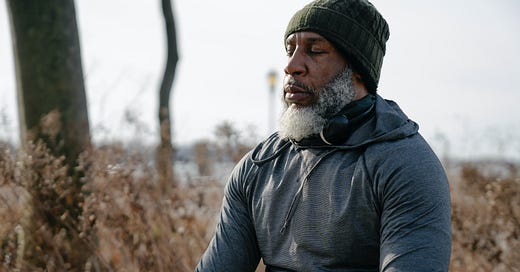Photo by Barbara Olsen on Pexels
I view the last three weeks as a period of intense, collective trauma. The twin impacts of the January 6th hearings and the Supreme Court decisions have flooded our collective consciousness. Meanwhile, there has been no moment of national mourning; no public reckoning with the fact that below the outrage is a well of grief.
As a trauma therapist—and as a human being—I know that moments like this tend to cleave our sense of wholeness. The mind races, darts, gallops forward. The body often slows down, or numbs out, or freezes up.
I’ve come to learn that as much as my mind might insist I do something, to stop the pain, to get beyond my frustration, that if my body isn’t ready, nothing will happen. Or, if I insist on overriding its messages, I’ll be repaid with muscle aches, insomnia, fluttering heartbeats, headaches, persistent nausea. The body speaks its distrust of actions taken without its consent.
Today’s post is here to encourage you to reflect on the way you’ve “received” the last three weeks, intellectually and emotionally. When you look over the ways you responded, were you more “in” your mind, or in your body? Were you engaged with your emotions, or were you overriding them with anxious thoughts or important actions? What actions did you take, if any? Who supported you, if anyone? How did you care for your own grief, or did you not feel grief at all?
And if you can’t recall the last few weeks, can’t answer the above questions, not to worry. If you want to better understand your own coping, you can use the questions now, in the coming week, to guide your attention.
The impact of structural violence on the self, and particularly the body, can be very hard to identify. Since these systems are in many ways the unacknowledged foundation upon which so much of the dominant culture rests, they are not often called out as actively creating violence, even as they are thrumming in the background, like the culture’s OS.
If someone came up and punched you in the gut and then stole your wallet, you’d have a story to tell about a violent attack. We’re told it’s normal to have a significant response to a physical assault. We can identify a perpetrator, an intent, an incident with a beginning, middle, and end.
Not so with structural violence. It’s often ongoing in its effects. It doesn’t have an individual actor as its engineer; it doesn’t have a clear, logical intention; it’s not personal. And due to our individualist culture, the presence of structural violence often eludes public conversation.
So if you aren’t suddenly, directly, personally impacted by a Court decision, or by what you heard in the January 6th hearings, it can be harder to track what it is you are responding to—is it your own empathy for others? Is it your sense of ambiguity, about the presence of power itself? Is it about your feelings of security or insecurity about the status of your relationship, your gender, your sexuality? Is it the feeling that something is coming but you aren’t sure what, yet?
Structural violence is an absent presence, like listening for footsteps in the darkness. And because structures like patriarchy and white supremacy rationalize and normalize violence that does land on the body, when the facts of our identities, our bodies, our cultures put us squarely in opposition to these structures, we can register this conceptual violence as if we had been physically attacked.
We know that the self’s traumatized nervous system does not differentiate between physical and emotional attack. And we know that certain kinds of violence don’t just cue a threat response in the present; they also awaken intergenerational histories of trauma, and the ways violence has landed on specific cultures.
The mainstream media has contributed to this collective trauma by responding to the hearings and the decisions with a raft of speculative reporting, along with its crucial and necessary factual reporting on the decisions. Much of this speculative reporting is about how much worse things are going to get, and how many more rights are going to be shredded in the next session of the Court. Other articles make pessimistic predictions about climate inaction, about Trump and his associates evading prosecution—as if the further collapse of democracy is assured.
Today, I’m not going to analyze that phenomenon. I’m just going to notice that it has an enormous and powerful physiological impact on its audience. I often speak with my clients about citizenship: what are our responsibilities, in terms of engagement with the news, or social media, or podcast consumption? How much is enough?
If we devote our time and attention to being as apprised as possible, does that rob us of time to act in a particular arena? Are we more able to engage in sustained, creative work if we disengage or limit our awareness of what is happening outside of our small sphere of influence? Is that an abdication of duty, and of our ability to relate to others? We use these questions as guideposts, to track our values, our time, our hopes.
The Practice
Today’s Action Snack asks you to engage in an action that allows you to attune to your emotional state. And it may be that before you can even engage in that action, you have to notice if you’re numb. You may have to take a look at how you’ve structured your day, and eliminate some things. You might need a bigger blank space, before you can even figure out what you’re feeling.
For some of you, it might be vigorous exercise, or yoga, or walking, that gets your body to start communicating its feelings. For others, it might be a long nap under a tree, and then some cloud watching and drifting, before you can ask yourself if you are feeling anything, at all.
If you find your mind is racing, and you can’t slow down enough to tune in, or you’re afraid to find out what you’re feeling, you might try thanking your mind for trying so hard to protect you. You might ask if it wants a break, even for fifteen minutes, to rest.
What can you do, today, to care for your grief, for your anger, for your sense of powerlessness? What can you do for your imagination and creativity? How can you soften the intensity of your thinking? How will you unhinge the kinks in your muscles, massage the soles of your feet, consider the temperature and scent of the air you’re breathing? How can you give yourself room to return to your own self, your own being, your own knowing?
Please share in the comments what you try, what you notice, and how you’re doing right now. I’d love to know, and to be here, to support you.













Share this post